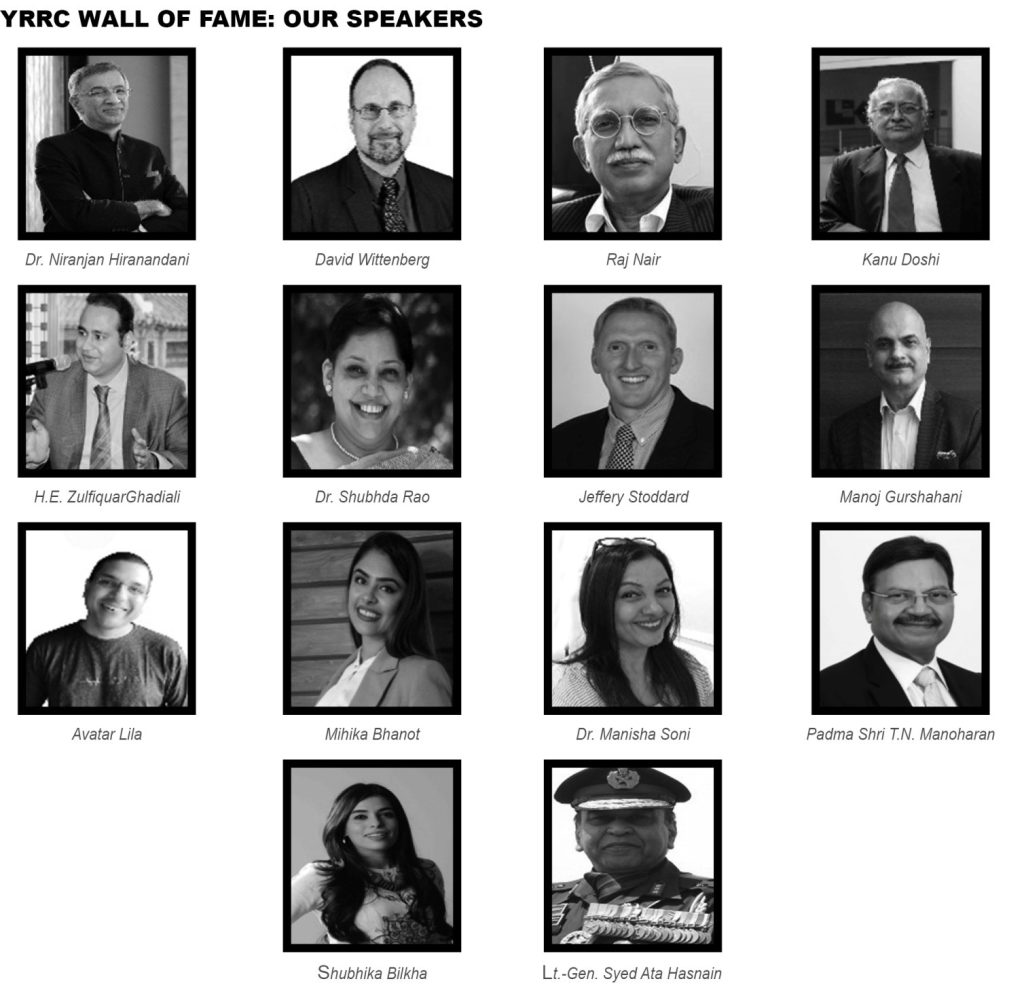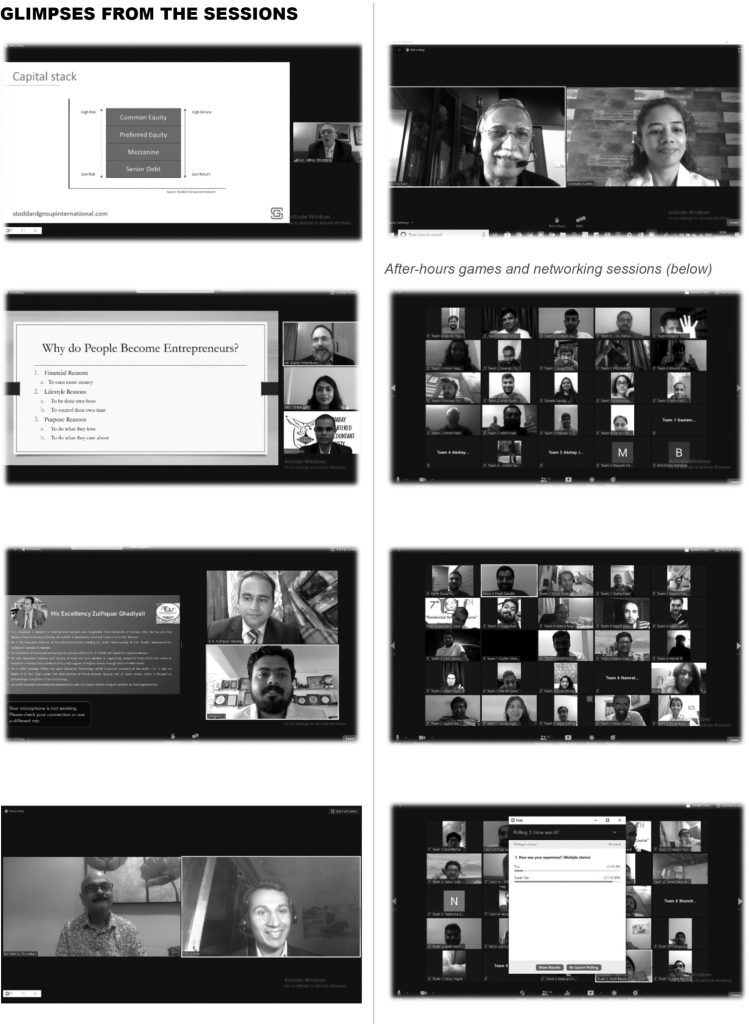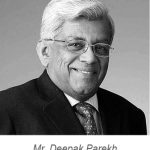7TH YOUTH RESIDENTIAL REFRESHER COURSE
The 7th YRRC was organised by the Human Resource Development Committee of the Bombay Chartered Accountants’ Society from 29th to 31st May, 2020. Considering the unusual circumstances of the nationwide lockdown due to the Covid-19 pandemic, a unique online RRC was conceptualised, wherein a wide variety of topics was organised across five sessions and ten hours over a three-day refresher course – all this from the comfort of the participants’ homes.
‘Seven Chakras of the Professional World’, the theme of the event, was meant to cover seven different aspects of the profession – World, Nation, Business, Network, Me, Mind and Soul. A perfect blend of knowledge, the YRRC provided a great opportunity to all the participants to expand their horizons. It sought to present different online networking activities for interaction amongst the global participants.
A glimpse into the events of the YRRC.
The YRRC covered 14 different topics addressed by a stellar line-up of speakers from across the world as under:
|
Topic |
Speaker |
| 1 |
Leadership |
Niranjan Hiranandani, Mumbai |
| 2 |
Entrepreneurship |
David Wittenberg, Mumbai |
| 3 |
The world has tipped: Are you prepared? |
Raj Nair, Mumbai |
| 4 |
Story of a shy boy from Gujarat to senior position in BCAS |
Kanu Doshi, Mumbai |
| 5 |
World economics |
H.E. Zulfiquar Ghadiali, Abu Dhabi |
| 6 |
Indian economics |
Dr. Shubhda Rao, Mumbai |
| 7 |
The role of development finance institutions and how to access funding for projects in emerging markets |
Jeffery Stoddard, Washington D.C. |
| 8 |
Networking from home |
Manoj Gurshahani, Mumbai |
| 9 |
Is work your identity? |
Avatar Lila, Mumbai |
| 10 |
Image management |
Mihika Bhanot, Pune |
| 11 |
Voice improvement & modulation |
Dr. Manisha Soni, Mumbai |
| 12 |
Sustainability of happiness |
Padma Shri T.N. Manoharan, Chennai |
| 13 |
Building resilience |
Shubhika Bilkha, Mumbai |
| 14 |
Living with the unknown – Anecdotal renderings from a lifetime experience of the unknown |
Lt.-Gen. Syed Ata Hasnain, New Delhi |
The content and the presentations by the speakers were clearly a class apart. They delivered their points and ideas with great clarity. They got the participants thinking on whether to be an entrepreneur or do a job in an industry or become an ‘intrapreneur’ (a new concept well explained). The participants obtained a better understanding of what skills one must possess to be a leader and how world economies play their role in shaping one’s life. We are all now at least aware of how to be ready for the world that has already tipped. One of the key learnings for the participants was ‘How to Network Digitally’, especially in the times of Covid and in our lives thereafter. They also got a glimpse into the concepts of voice modulation and image management as well as their importance in our personal and professional lives. The participants were given deep insights into and made aware of the importance of being prepared for any unforeseen situation, be it a war-room or a boardroom.
Their sensitivities tickled, the participants came up with interesting questions that were addressed extensively by the speakers, and yet left everyone wanting more. In fact, all the scheduled breaks between speakers were invariably used in extracting even more out of the knowledgeable speakers.
The event had over 150 participants from 26 cities across the world, with technology diminishing the distance between their locations.
| Agra |
Bhilwara |
Jaipur |
Mumbai |
Porbandar |
| Ahmedabad |
Birganj (Nepal) |
Jamnagar |
Nagpur |
Pune |
| Aurangabad |
Chennai |
Nairobi |
Nashik |
Thane |
| Bangalore |
Coimbatore |
Lucknow |
Navi Mumbai |
Vadodara |
| Bareilly |
Hyderabad |
Margao |
Navsari |
Varanasi |
The participants also took active part in the after-hours sessions like the ‘People Tambola’; ‘Lost on the Island’ – a strategy game; and a Relay Video challenge called ‘YRRC’s Got Talent’. Though there was no physical interaction between the people, all these activities ensured optimum networking. At the end of the YRRC, everyone had made some new friends in the profession whose support they could draw upon at any time. For participation in these networking activities, the participants were divided into six teams and points were awarded to the teams for the different activities.
At the closing session, participants were already asking about the next YRRC! They truly appreciated the concept and execution of the event. It was an event that was truly ‘By the Youth, Of the Youth and For the Youth’. The participants bid farewell to one another and promised to stay connected digitally.


The Team – Behind the Scenes

Top L-R: Ankit Gudhka, Prajit Gandhi, Namrata Dedhia, Anand Kothari
Middle L-R: Namrata Shah, Virag Shah, Dhruv Shah, Kinjal Bhuta
Bottom L-R: Sneh Bhuta, Naushad Panjwani
In Circle: Gaurav Save
DEEPAK PAREKH DELIVERS FOUNDING DAY LECTURE
For the first time in the history of the Bombay Chartered Accountants’ Society, the Founding Day lecture was delivered online before a virtual audience. It was the 72nd Founding Day and the programme lined up for the evening was a mouth-watering one – a talk by the inimitable Mr. Deepak Parekh, Chairman of HDFC and a qualified Chartered Accountant.
Organised with the help of the software called ZOOM, the meeting was held on 6th July and was witnessed by 135 online viewers – plus another 2,500 enthusiasts who watched it on YouTube.
The subject itself was intriguing, ‘CAs in Uncharted Times’, and the speaker was a stalwart in every sense of the term.
President Manish Sampat performed three functions. He welcomed the speaker, gave the viewers a brief background of the activities of the BCAS and also introduced the speaker.
Mr. Parekh started his talk by complimenting the Society on its leadership in the profession and said that 72 years was indeed a very long time for an institution to sustain its reputation and retain its values. He also lauded BCAS for the illustrious speakers that it had invited for its Founding Day lectures in previous years.
He pointed out that the world was going through unprecedented times with no past model against which to benchmark it. In such times, decision-making was difficult because the future was just not predictable. Therefore, the need of the hour was ‘inclusive leadership’ which could help institutions to sail through. This would be possible only through collaboration and the free flow of information between individuals and institutions rather than by working in silos.
Recalling an oft-repeated dictum, he said that there were decades when nothing happened and then there were weeks when decades happened. Therefore it was imperative to understand that the time had come to reset skills. At the same time, there was a silver lining in the current situation – it was time to accept the reality of staying at home and using that as an opportunity to develop patience and to spend quality time with near and dear ones.

In such unchartered times, CAs, especially auditors, would have to be willing to meet the challenges in respect of internal controls and possibly redefine their work so that scams do not get uncovered later. Several recent experiences of large-scale frauds had pointed to the need for auditors to become more intuitive and ensure that valuations are conservative and the concept of ‘going concern’ in the changed paradigm is not compromised. This would go a long way to help protect the interests of all stakeholders. India, despite its much acclaimed developments on many fronts, had not made much progress on human health economy to tackle crises of such enormity and scale as posed by the coronavirus pandemic.
Mr. Parekh said that India was seeing its fourth recession in recent times. But unlike the previous recessions which were due to agricultural failure, the current recession was of a different dimension. The fiscal deficit was high, corporate performance was subdued and the realty sector was saddled with stock that was difficult to liquidate. However, the positive aspect was that India could see some green shoots thanks to the bumper crop, current account surplus, and maintenance of investment grade status by credit rating agencies, low interest rates and increased FII inflows resulting in a robust foreign exchange reserve balance.
He lamented the fact that rating agencies were being unfair to India in not giving due credence to these facts. Liquidity was returning to NBFCs, global crude rates were at their lowest and GST collections were showing steady signs of returning to normal levels. Under these circumstances, there were sufficient new opportunities such as Environment Social Governance (ESG) and technology-oriented new areas such as Data Analytics, IT Audit, Artificial Intelligence and Big Data for small and medium CA firms and the CAs must make efforts to adopt them. The vast data collected and available will need analysis and none better than CAs would be able to do justice to it. He firmly believed that there was enough room for the SME sector to co-exist with the ‘Big 4’. He, however, agreed that there was need to improve the compensation standards for CAs to ensure better quality work and to justify the responsibilities, risks and liabilities that they undertake.
Overall, Mr. Parekh exuded an aura of positivity, asserting that India and its CAs had a very bright future. A significant difference would be made by the resilience of the Indian people and the strength and ability of domestic consumption to help the economy to bounce back.
The vote of thanks was proposed by Hon Jt. Secretary Mihir Sheth.
VIRTUAL TALK ON ‘INSPIRED LIVING’
Dr. Mayur B. Nayak conducted an inspiring virtual session ‘Inspired Living’ for the Study Circle of the Human Resource Development Committee on 14th July.
He started by pointing out that the human body is made up of five basic elements of nature, namely, earth, water, fire, air and space known as Panch Mahabhutas in Sanskrit. These exist in different proportions. For example, our body consists 72% of water.
Balancing these five elements is of utmost importance for good health. Such a balance can be attained by the practice of yoga / exercises, mudras, pranayama, through natural sources, diet variations and meditation.
Drawing an analogy, Dr. Mayur pointed out that the five elements could be said to be related to five different aspects of the human personality, namely, (i) Physical, (ii) Mental and Emotional, (iii) Intellectual – Personal and Professional, (iv) Social, and (v) Spiritual.
Earth element was linked to the physical dimension of one’s personality. Hence it was important to remain grounded and physically fit for taking a major leap in life. Emphasis was placed on the three key Pranayamas, viz., Anulom Vilom, Bhastrika (followed by Sheetali) and Kapal Bhati to increase one’s immunity to fight the current corona pandemic. By chanting the ‘Omkar’ mantra properly, one can control the movement of energy in one’s body. Participants were taught the correct way of deep breathing to reduce stress and tension.
The second element water was linked to the mental and emotional dimensions of one’s personality. One must replace fear with faith, hatred with love, and shame with freedom to attain emotional maturity. A unique 3A constitution of ‘Accept, Adjust and Appreciate’ was shared with the participants to help improve the inter-personal relationships. ‘Respond and not react’ was given as the mantra to control anger.
Fire element was linked to the intellectual dimension of one’s personality, leading to personal and professional growth. One must ignite the fire of passion to succeed in life. The first step is to do a SWOT analysis, followed by developing a right attitude in life. Self-belief is the key to success. One must try and explore the hidden potential within, Dr. Mayur said.
Air element was linked to the social dimension of one’s personality. The emphasis was on spreading one’s fragrance through good deeds. Giving is the nature of the Divine. It was revealed that one can give many things apart from money, such as smile, love,
hope, blessings, support, hugs, moral support, education, time, appreciation, happiness and so on. Covid-19
had offered a lot of opportunities to give. And for giving one must develop love and compassion in one’s heart.
Finally, the space element is linked to spiritual growth. The difference between spirituality and science / religion was explained. Eight steps of Astang Yoga to attain nirvana were highlighted. Spirituality as a way of life was explained with a detailed elaboration of the spiritual values of life. Emphasis was placed on meditation as a panacea for balanced growth in all dimensions of the personality to live an inspired life.
The talk comprised of an audio-visual presentation, followed by a Q&A session.
The speaker, Dr. Mayur Nayak, also gave some lessons to be practised at home for ‘Inspired Living’. The Study Circle was well attended by over 70 participants. The presentation is available on the YouTube Channel of the BCAS.

















